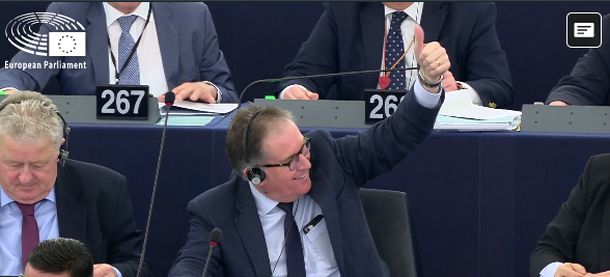
While the EU Member States have not yet concluded on the newly proposed EU-Morocco fisheries agreement for waters offshore occupied Western Sahara, the Commission is already pushing the European Parliament to get to work.
Above: Greenpeace demonstrates against foreign fishing vessel operating on a Moroccan licence in occupied waters.
In only two weeks from now, the two parties in the conflict of Western Sahara - Morocco and the liberation movement Polisario - are meeting for the first UN peace talks in a decade.
Instead of putting pressure on the occupying power of Western Sahara weeks prior to the UN peace talks, the EU Commission is engaged in two parallel lobby efforts to include Western Sahara in two EU agreements with Morocco. The Commission amended the agreements to expressly apply to Western Sahara, after the Court of Justice of the European Union (CJEU) stated such inclusion was in violation of EU law.
One of the two fronts is related to the EU-Morocco trade on agriculture and fisheries agreements (WSRW has in the last months covered the process of that agreement through the EU institutions). The other is relating to a new Fisheries agreement and Protocol.
21 November 2018, marked the start of the European Commission's official fisheries lobby vis-à-vis the parliament.
This afternoon, the Commission officially presented the newly proposed EU-Morocco Sustainable Fisheries Partnership Agreement (SFPA) and the Protocol thereto in the Parliamentary Committees for Fisheries and for Budget. The SFPA replaces the 2007 Fisheries Agreement, following the judgment of the EU Court of Justice of 27 February 2018, concluding that applying the agreement to Western Sahara was contrary to binding rules under international law, namely the principle of self-determination. The Member States then decided to mandate the Commission to negotiate a new Agreement with Morocco, and to have that apply explicitly to Western Sahara. In addition, a new Protocol - which sorts the technical implementation of the agreement for a four-year period - had to be renegotiated. A new Agreement and Protocol were initialed on 24 July 2018.
Both the Member States and the Parliament are still to agree to the proposed texts. Things are heating up in Council, and a vote is expected in the next weeks. In Parliament, procedure would normally take a bit more time, as different committees are to evaluate the proposals before a vote in plenary can be scheduled. Much to the frustration of Spain, whose Minister of Fisheries Luis Planas visited the European Parliament in mid-October already, to call for a "rapid ratification". The Spanish fleet is the main beneficiary of the fish opportunities available under the proposed Agreement and Protocol. The EU fisheries in the waters offshore Western Sahara originate from a deal signed by the Franco regime with the Moroccan government, as Spain allowed the territory to be illegally annexed in 1975.
Seems the insistence of Spain and the EU commission worked, and Parliament's procedure will be rushed: the political groups' presidents have agreed to have all resolutions adopted by February 2019 - thus also on this Fisheries Agreement. Rapporteurs have already been appointed: for the Fisheries Committee it will be French christian-democrat Alain Cadec, for the Budget Committee Portuguese christian-democrat José Manuel Fernandes.
Though the Commission was supposed to present its Agreement today, Rapporteur Cadec took the opportunity to already present his draft findings: that this agreement complies with the CJEU ruling, has the consent of the local population and that there are benefits to the local population. Furthermore, he alleged that it ensures sustainable fisheries in the area.
The Commission was equally sure of itself. Director General of DG MARE João Aguiar Machado stated that the new Agreement was crucial for the EU and Morocco, and their bilateral relation, and also for the "Sawari people" (sic). The requirements of the Court have been met, he stated: there is a specific mention of Western Sahara in the Agreement. In addition, the Commission and the EEAS have made "all reasonable efforts" to ascertain the consent of the local population through "an extensive consultation process". And an exchange of letters between the EU and Morocco testifies to the EU's respect for the UN process, without prejudicing its outcome. Vincent Piket of the EEAS stressed that the Agreement is supported by those who were consulted, who also had suggestions to increase the benefits and the investment to the fish processing sector, the obligatory landings and employment of local sailors. Mr Piket explained that Polisario did not want to take part in the consultations, as did a number of international NGOs, over political reasons. He added that the positive impact of the agreement is visible in Western Sahara, where "critical infrastructure" has been built with EU structural support. He also mentioned that the trade and fisheries agreement are mutually reinforcing: the fish processing industry will be expanded in Western Sahara, and that will only make sense if the products can be exported through the trade deal.
MEPs did not agree. All, except for the Spanish MEPs Aguilera García (S&D) and Millán Mon (EPP) and UKIP MEP Coburn, raised doubts on the legality of the proposal.
Finnish MEP Nils Torvalds (ALDE) warned that the EU stands to waste more years on court cases, which is not to the benefit of the EU fleet. Italian MEP Renata Briano (S&D) agreed that "we are heading for trouble", and that consent has not been obtained from the Polisario - which is recognised by the UN as representing the people of Western Sahara. Ulrike Rodust (Germany, S&D) and Isabelle Thomas (France, S&D) did not appreciate being rushed, fearing it will "bring us on thin ice" from a legal perspective. Thomas added that Polisario was invited to the consultation on two days' notice, which seems unfair. Linnéa Engström (Sweden, Greens/EFA) alerted that the money had been paid to Morocco under the previous Protocol for projects in Western Sahara, and asked what measures are takien to recuperate that illegally spent money. She asked why the Commission would finance settler projects on occupied land, given that the Commission's own evaluation says that no Saharawis work in the fishing sector, and whether Morocco can lawfully issue certificates in Western Sahara, given it's lack of sovereignty. Ana Miranda (Spain, Greens/EFA) pointed to the Commission's constant mixing of the concepts of people and population. It is the people who ought to consent, and benefit - not the population, she said. The way forward for MEP Miranda is to have two fish agreements: one for Morocco, and one for Western Sahara. Portuguese socialist Marinho e Pinto insisted that the law has to be followed: the EU is rooted in rule-of-law - and "we cannot go against our highest Court".
Though Rapporteur Cadec's opinion is not yet available, he already announced the incredibly tight deadline for amendments: 3 December 2018.
Old wine, new sack
The new agreement differs from the previous one in one main aspect: it now refers explicitly to Western Sahara as part of its area of application. Specifically, that area is defined by art. 14 and art. 6 of the agreement, as the territories subject, on the one hand, to the Treaty establishing the European Union, and, on the other hand, to the Moroccan laws and regulations governing fishing activities in that zone.
"Given that the Court already in February this year rejected the very notion that Morocco has any right to the territory, it is hard to see how the idea to sign a new agreement with Morocco for that same territory will hold up. Consulting an undisclosed list of interlocutors, which does not include the UN-recognised representation of the people of Western Sahara, does not seem to comply with the right to self-determination of the people of Western Sahara - the cornerstone principle set forth by the Court", Sara Eyckmans of Western Sahara Resource Watch stated.
The new proposed Protocol offers Morocco more European tax payers' money than the previous one: the 2013 Protocol cost the EU an annual €30 million, split over a €16 million access fee and an additional €14 million in sectoral support - money spent on furthering Morocco's fishing sector. That money was mainly spent in occupied Western Sahara, however, as WSRW managed to dig up. In addition to the EU money, Morocco also received fees from the European fishermen, at around €10 million per year. The current proposal will cost incrementally more, which each passing year: for the first year, the EU will pay Morocco €19.1 million for access, €17.9 million sectoral support, and the fishermen will cough up €11.1million in fees - a total of €48.1 million. For the second year, a total of €50.4 million will be paid, broken down as €20 million for access, €18.8 million sectoral support and €11.6 million from the fishermen. For the third and fourth year, the EU will spend public funds on €21.9 million for access, €20.5 million sectoral support, and the fishermen pay 12.7 million in fees - totaling €55.1 million. All in all a significant increase, but still below the €80 million that Morocco had demanded.
In return for a higher pay-check, the Moroccans have offered a higher quota of pelagics - which are fished exclusively in occupied Western Sahara. Category 6 of the agreement - covering industrial pelagic or semi-pelagic trawling and purse-seining - corresponds to the area between 26°07'00"N and 20°46'13"N, which is located entirely in occupied Western Sahara. In other words, Morocco stands to receive more EU tax payers' money for offering more fish from a territory to which it has no claim whatsoever.
The quota in category 6 go up incrementally: a total of 18 vessels can fish 85,000 tonnes in the first year, 90,000 tonnes in the second year, and 100,000 tonnes in the third and fourth year of the Protocol. The other 5 categories have practically been unchanged from the 2013 Protocol: the only difference is a slight increase in the number of vessels allowed to fish in category 1, which covers small scale pelagic fishing in the north of Morocco proper: that is now 22 instead of 20 vessels. Over all categories, 128 EU-flagged vessels will be allowed to fish in Morocco and occupied Western Sahara, per the suggested Protocol. Most of the activity will take place in Western Sahara - a territory the EU Court of Justice considers "distinct and separate" from Morocco.
Here is the EU Council's legal advice on fishing in occupied waters
Hans Corell criticizes EU fisheries in Western Sahara
The former Legal Counsel to the UN Security Counsel, Mr. Hans Corell, comments on the EU's fisheries activities in Western Sahara.
EU Court reaffirms position on Western Sahara
Polisario has a case, but it should be pursued when the time is right, Court implies.
European Parliament disregards Court and adopts Morocco fish deal
Notwithstanding four consecutive rulings of the EU's highest Court calling such a practice illegal, the European Parliament has just now voted in favour of the EU-Morocco Fisheries Agreement that will be applied to the waters of occupied Western Sahara.


